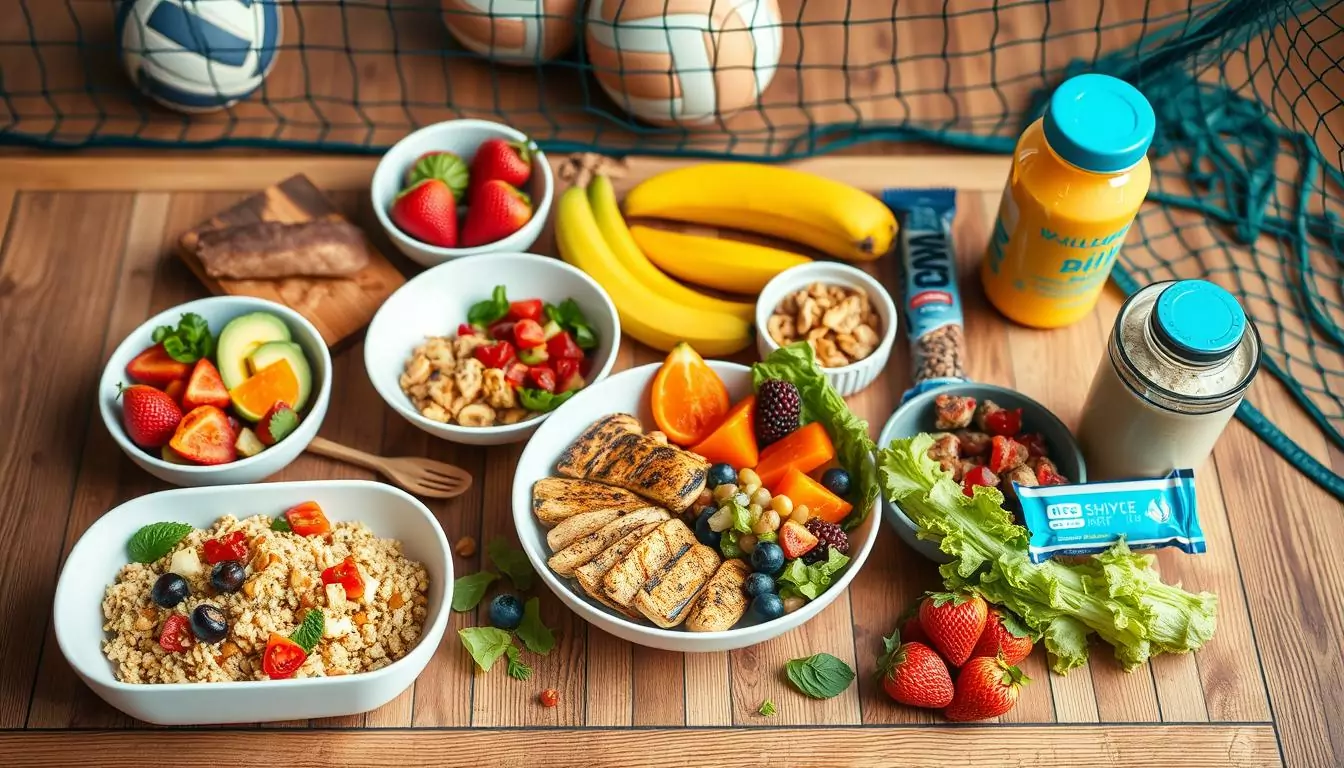70% of sports-related brain injuries affect athletes under 18. This fact shows why proper nutrition is vital for young volleyball players. Good nutrition fuels performance and protects health.
The U.S. Women’s National Volleyball Team takes nutrition seriously. They pack their own ingredients when traveling for tournaments. This dedication shows how important tailored nutrition is for female volleyball athletes.
Your volleyball diet can make or break your court performance. Understanding the right nutrient balance is crucial. Let’s explore how to optimize your meals for better game play.
Female athlete nutrition isn’t one-size-fits-all. It’s a careful balance of macronutrients, timing, and personal needs. A typical volleyball meal plan includes 50% carbs, 25% fat, and 25% protein.
This breakdown gives you energy to spike, block, and dive powerfully. It ensures you can perform with precision throughout the game.
Effective athlete meal plans consider what and when you eat. Pre-game fueling needs differ from post-match recovery. Tournament energy maintenance requires a unique approach.
Understanding these nuances helps you support your body’s needs. You can tailor your nutrition for every stage of your volleyball journey.
Key Takeaways
- Proper nutrition is crucial for performance and injury prevention in volleyball
- The U.S. Women’s National Team prioritizes nutrition, even during travel
- A balanced volleyball training diet typically includes 50% carbs, 25% fat, and 25% protein
- Meal timing is as important as meal content for optimal performance
- Customized nutrition plans can significantly impact an athlete’s power and endurance
- Proper hydration and electrolyte balance are essential components of sports nutrition
Understanding Volleyball-Specific Nutritional Needs
Volleyball requires explosive power, agility, and endurance from female athletes. Your nutrition plan is crucial for meeting these physical demands. A balanced diet can boost your performance on the court.
Carb-loading is key to fuel intense gameplay. Aim for 50% carbohydrates in your diet. This helps maintain energy levels during matches and training sessions.
Protein is equally important for athletes. A diet with 25% protein supports muscle recovery and growth. Consume about 25g of protein per meal to maintain lean muscle mass.
Don’t overlook hydration. Proper fluid intake is vital before, during, and after matches. Even mild dehydration can hurt your agility and endurance on the court.
| Nutrient | Percentage of Diet | Benefits for Volleyball Players |
|---|---|---|
| Carbohydrates | 50% | Sustained energy, improved endurance |
| Protein | 25% | Muscle recovery, strength maintenance |
| Fat | 25% | Hormone production, nutrient absorption |
Your nutritional needs may vary based on age, weight, and training intensity. A personalized meal plan can help you achieve optimal performance. Good nutrition is your secret weapon for dominating the volleyball court!
Pre-Training and Match Day Meal Planning
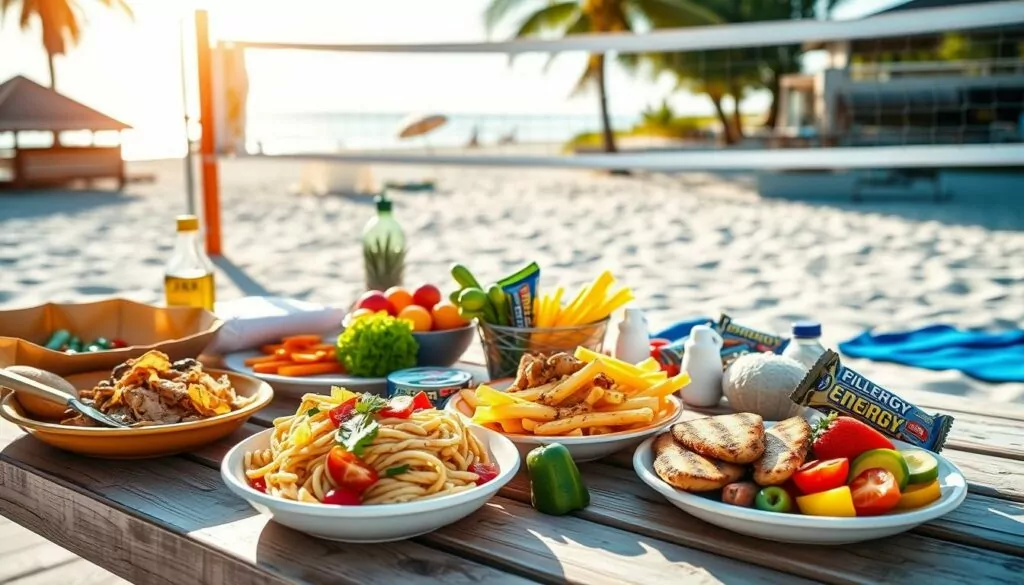
Meal planning is vital for volleyball athletes’ success. A well-designed meal plan can boost your performance significantly. Let’s explore effective strategies for fueling your body.
For early morning training, focus on simple carbs. Try graham crackers, low-fiber cereal, or toast for quick energy. With more time, add fibrous carbs, moderate protein, and some fat.
On match day, timing is crucial. Eat a balanced meal 3-4 hours before the game. Include complex carbs, lean protein, and a small amount of healthy fats.
- Whole grain pasta with grilled chicken and vegetables
- Brown rice with lean beef and steamed broccoli
- Quinoa salad with grilled fish and mixed greens
Each athlete is unique. Test different foods during training to find your ideal pre-game nutrition. Pay attention to your body’s responses and make adjustments as needed.
“I typically have two breakfasts – one before and one after my training sessions. It helps me stay energized throughout the day,” says beach volleyball star Melissa Humana-Paredes.
Hydration is crucial for your pre-game routine. Start drinking water early and sip regularly throughout the day. For longer events, consider adding electrolytes to maintain proper fluid balance.
Post-Game Recovery Nutrition Strategies
Your body needs proper fuel to recover after an intense volleyball match. Post-game nutrition helps replenish energy and repair muscle tissue. Let’s explore some effective recovery strategies.
Timing is crucial for post-game meals. Eat a balanced meal within 30 minutes to 2 hours after your match. This helps restore glycogen levels and start muscle repair.
Protein requirements for athletes are higher than for non-athletes. Include a good protein source in your post-game meal.
Here’s a sample post-game meal plan:
- Grilled chicken breast with quinoa and roasted vegetables
- Greek yogurt parfait with mixed berries and granola
- Whole grain toast with avocado and scrambled eggs
Don’t forget about hydration! Drink water or a sports drink with electrolytes. Proper hydration helps transport nutrients and flush out toxins.
Sleep is crucial for post-game recovery. Aim for 7-9 hours of quality sleep each night. This allows your body to repair and recharge.
If you’re tired after a late-night game, try a short nap earlier in the day. A 20-30 minute nap can boost your energy levels.
| Recovery Strategy | Recommended Timing |
|---|---|
| Post-game meal | Within 30 min – 2 hours |
| Hydration | Continuously throughout the day |
| Sleep | 7-9 hours per night |
Recovery is different for everyone. Pay attention to your body’s needs. Adjust your nutrition and sleep as needed. This will help you feel energized and strong for your next match.
Essential Macronutrients for Female Athletes
Female athletes need a balanced diet for top performance. The right mix of nutrients powers their game and aids recovery. Let’s dive into the key elements of a volleyball player’s meal plan.
Carbs are vital for volleyball players’ energy. A study on NCAA Division I female volleyball highlights their importance. Players should aim for 5-8 g/kg of body weight daily during training.
Athletes need more protein than non-athletes. Female volleyball players require 1.2-1.7 g/kg of body weight daily. This helps repair and build muscle after tough workouts.
Healthy fats play a crucial role too. They should make up 20-35% of total calories. Good sources include avocados, nuts, and olive oil.
“Proper nutrition is not just about fueling performance; it’s about supporting overall health and longevity in the sport.” – Sports Nutritionist
Here’s a breakdown of recommended macronutrient ratios for female volleyball athletes:
| Macronutrient | Percentage of Total Calories | Grams per kg of Body Weight |
|---|---|---|
| Carbohydrates | 50-60% | 5-8 g/kg |
| Protein | 15-20% | 1.2-1.7 g/kg |
| Fat | 20-35% | 1-1.5 g/kg |
These are general guidelines for macronutrient intake. Your needs may vary based on training, body type, and goals. A sports nutritionist can help tailor your diet for peak performance.
Hydration Guidelines and Electrolyte Balance
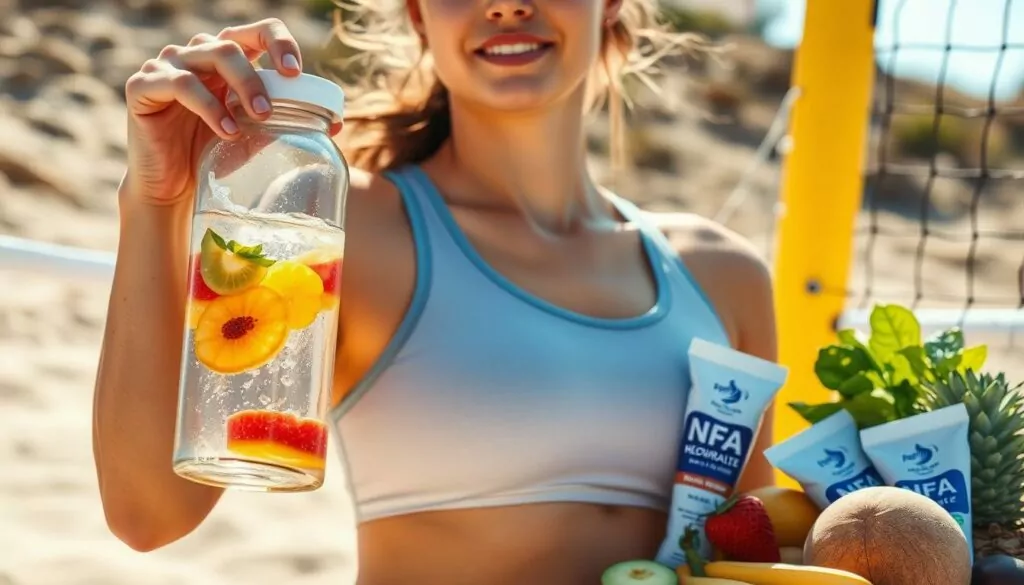
Proper hydration is vital for volleyball players’ peak performance. Athletes can lose up to 2 quarts of fluid per hour during intense play. This loss affects performance, flexibility, speed, muscle function, and endurance.
To stay hydrated, follow these tips:
- Drink 24 ounces of sports drink 2 hours before activity
- Consume fluids every 20 minutes during play
- After the game, drink 16-24 ounces of water or hypotonic sports drink
Electrolyte balance is crucial in sports nutrition. Athletes lose these minerals through sweat, urine, and breath. Sodium, potassium, calcium, and magnesium are essential for nerve and muscle function.
Sports drinks help maintain electrolyte balance during intense matches over 45 minutes. They contain water, electrolytes, and carbohydrates for energy. Pick drinks based on your needs and activity level.
| Hydration Sign | Recommended Action |
|---|---|
| Light yellow urine | Maintain current fluid intake |
| Dark urine | Increase fluid consumption |
| Muscle cramps | Replenish electrolytes |
| Fatigue or dizziness | Drink water and rest |
Be careful not to overdrink high-sugar sports drinks. This can lead to extra calories. For personalized hydration plans, talk to a sports nutrition expert.
Supplements and Sports Nutrition Products
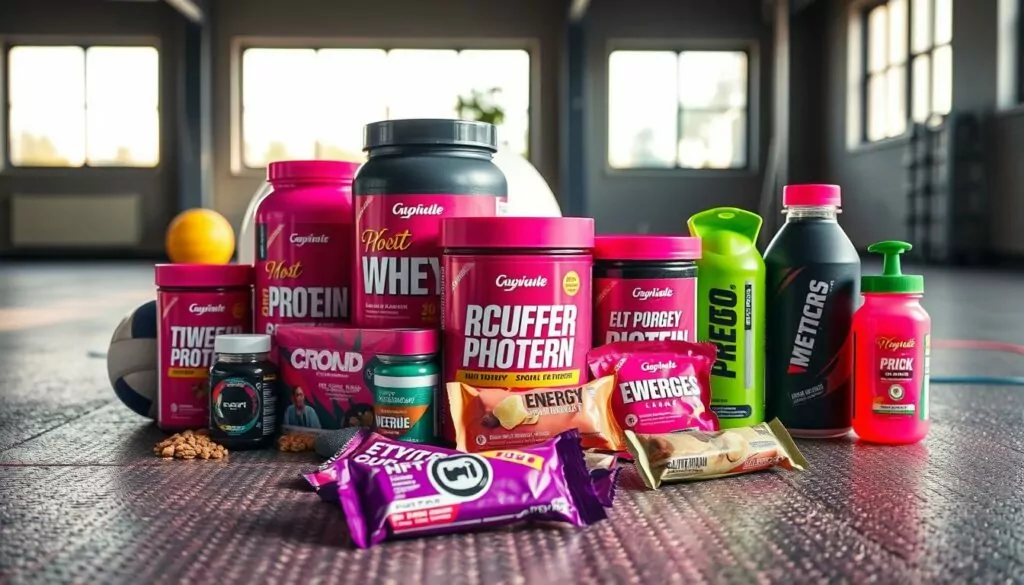
Sports nutrition is vital for an athlete’s success. Female volleyball players need to know about protein requirements for athletes. Active women should aim for 0.8 to 1.2 grams of protein per kilogram of body weight daily.
Protein supplements can boost athlete meal plans. The best time to take them is usually after workouts. Popular options include whey, casein, soy, and egg white protein.
Choose supplements with the Informed Sport logo. This shows they’ve been tested for banned substances. Safety and quality are key in sports nutrition.
Other supplements can also improve performance. A study found caffeine helped female volleyball players. They took 5 mg/kg before training and saw better physical performance and less fatigue.
Supplements should add to a balanced diet, not replace whole foods. Eating right consistently is crucial for peak performance. Poor nutrition can quickly affect female athletes’ performance.
“Women athletes require superior nutrition than men to excel in their performances.”
Iron-rich foods are essential for female athletes. Include red meat, poultry, seafood, beans, and lentils in your meals. Tofu and spinach are also great options.
Proper nutrition education is key for athletes. Personalized meal planning helps optimize performance. Access to sports nutrition experts can make a big difference.
Meal Timing and Tournament Day Nutrition
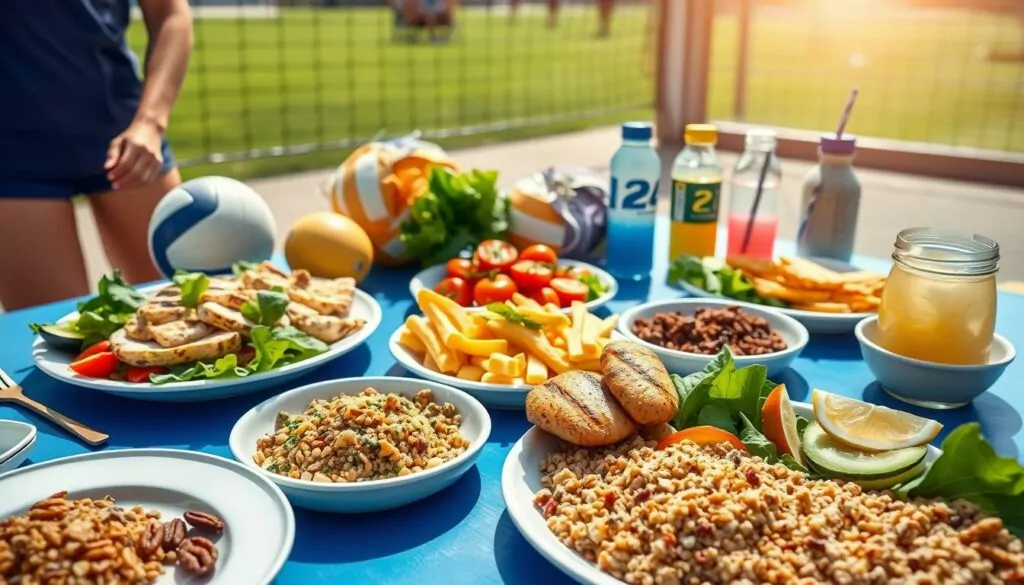
Proper meal timing is crucial for volleyball athletes. Your meal plans should match your training and game schedules. For morning workouts, eat a light snack of simple carbs.
If you train in the afternoon, have a balanced lunch 2-3 hours before. On tournament days, eat easy-to-digest carbs and moderate protein 2-3 hours pre-game. This fuels your performance without making you feel heavy.
After matches, focus on protein and carbs for recovery. Here’s a quick guide for pre-game nutrition:
- Large meals (700-1000 calories): Eat 4+ hours before
- Medium meals (500-700 calories): Eat 3 hours before
- Small snacks (300 calories): Eat 1 hour before
- Liquid meals (300-500 calories): Consume 1-2 hours before
For morning games, keep breakfast under 300 calories but high in carbs. For afternoon matches, aim for a 500-calorie breakfast. Have a light lunch before evening games.
Stay hydrated! Check your weight before and after matches. Drink 16 ounces of fluid for each pound lost. This helps maintain peak performance throughout tournaments.
“Nutrition is not just about what you eat, but when you eat it. Timing is everything in volleyball performance.”
Post-game recovery nutrition is just as important. Refuel with protein and carbs to help your body repair. This prepares you for the next challenge.
Conclusion
Effective nutrition plans are vital for female volleyball athletes’ peak performance. Your volleyball diet should balance macronutrients, hydration, and timing. Proper sports nutrition fuels gameplay and aids recovery.
Volleyball players face unique challenges during matches. Increased stress and fatigue can affect your performance. Your body’s antioxidant levels may drop mid-season.
Tailored meal plans are crucial for athletes. They help maintain energy and reduce muscle damage. These plans also speed up recovery after intense games.
Smart supplementation can enhance your performance. Creatine helps with quick energy production. BCAAs may reduce fatigue during long tournaments.
Caffeine can sharpen your focus when timed correctly. Be cautious with evening doses to protect your sleep. Fine-tuning your nutrition strategy is an investment in your athletic future.
